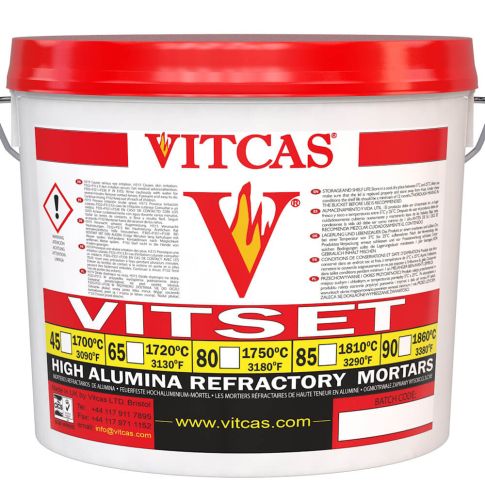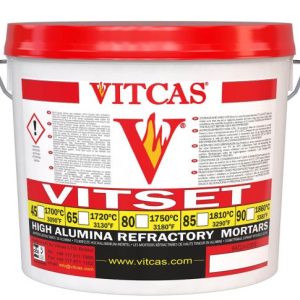A key building material for furnace construction is refractory mortar. How to choose the best material for building a furnace? Before purchasing, it’s essential to understand the properties of this product.
Furnace mortar is designed to securely bond the structural elements of this heating device, while also providing high durability in extreme thermal conditions, reaching temperatures of up to 1860°C. Additionally, it must withstand sudden temperature changes to prevent the mortar from cracking. Fireproof mortar should also have good adhesion and low shrinkage to avoid gaps that could reduce the furnace’s energy efficiency. Properly applied refractory mortar ensures the safety of the entire heating structure.
Types of Refractory Mortars: What to Know Before Buying?
The Vitcas online store offers a variety of refractory materials for furnaces, with the choice depending on the type and purpose of the furnace. Classic refractory mortar is ideal for constructing heating devices that operate at high temperatures. Acid-resistant mortar can also be used to bond tiles and bricks exposed not only to high heat but also to acids. The Vitcas store also offers high-alumina refractory mortars with a high alumina content, as well as silica-based mortars cured with silica. When selecting the appropriate furnace cement, it’s essential to consider its chemical composition to ensure proper use.
Application of Refractory Mortars in Furnace and Fireplace Construction
Refractory mortars play a crucial role in the construction and renovation of furnaces and fireplaces, as they ensure the structure’s durability even under extreme thermal conditions. They are specially designed to withstand high temperatures, often exceeding 1000°C and even reaching 1860°C in industrial furnaces. Depending on their chemical composition, these mortars can have different properties, such as acid resistance, which is essential for furnaces operating in aggressive environments. The Vitcas store, specializing in refractory materials, offers various types of mortars – from classic mortars for furnace construction to acid-resistant mortars ideal for installing refractory tiles and bricks. Choosing the right type of mortar directly impacts the safety and thermal efficiency of the entire structure, so it’s worth paying close attention to its composition and intended use before starting construction.
Recommended Reading:
High-Temperature Cement, Key Applications and Properties
Refractory Cement: A Reliable Binder for Durable Constructions
Properly selected furnace mortar has a direct impact on the furnace’s efficiency, durability, and safety. It’s worth spending time carefully choosing the right binder to avoid potential future damage to the heating device.

